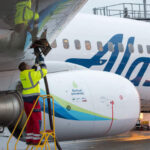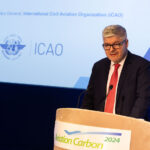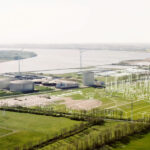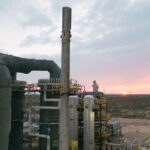Two US-based renewable fuel companies, LanzaJet and Marquis Sustainable Aviation Fuel, have announced plans to build a substantial new plant near Chicago, with annual capacity to produce up to 120 million gallons (454 million litres) of sustainable aviation fuels and renewable diesel to help meet rapidly-rising global demand, reports Tony Harrington. The companies have signed a Memorandum of Understanding to develop what they call “the first of a kind integrated facility” which will use on-site carbon capture and sequestration, and rely on renewable energy to produce SAF using LanzaJet’s alcohol-to-jet technology to convert low carbon intensity feedstocks to low-emission fuel. The development as proposed by the companies would increase significantly the amount of SAF produced in the US, and advance LanzaJet’s ambitions to produce one billion gallons (3.8 billion litres) of SAF per year by 2030, one third of the three billion gallons that the Biden Administration is targeting for production in the US in the same timeframe.
The two companies said life-cycle greenhouse gases from fuels produced at the new facility would be 70% less than those of fossil-based aviation fuel as a result of employing on-site CCS and using renewable energy. LanzaJet CEO Jimmy Samartzis said the partnership with Marquis “demonstrates the opportunity for the US to produce meaningful volumes of sustainable aviation fuel at scale, transitioning feedstocks from the production of traditional biofuels into sustainable aviation fuel.” He stated SAF produced from existing sources alone could more than halve fossil fuel jet use in America. “The key is low carbon intensity, where existing infrastructure is paired with carbon capture and sequestration, and renewable energy. Marquis is doing exactly this and makes for a great partnership with LanzaJet.”
Like LanzaJet, family-run Marquis is headquartered in Illinois and has ambitions to be “the world’s leading producer of sustainable fuels”, with plans for the future production of renewable diesel for road transportation and blue hydrogen and blue ammonia for marine transportation and agriculture decarbonisation.
The new facility will be constructed on a 2,500-acre site within the Marquis Industrial Complex in Hennepin, Illinois, which is being developed to be what that company calls “the world’s first carbon-neutral industrial complex, with on-site access to carbon injection.” The site, situated south-west of Chicago, is also close to key pipelines that are able to deliver SAF to Chicago’s O’Hare International and Midway airports, and is connected to major rail, road, and water transport infrastructure, enabling national and global distribution. The complex is situated on the Mt. Simon geological formation, with the capacity to store over 100 million tons of carbon dioxide. Marquis claims it could become the world’s first carbon-neutral industrial complex with on-site access to carbon injection.
“LanzaJet’s alcohol-to-jet technology will be fully integrated into our sustainable fuels plant with a focus on producing sustainable aviation fuel and renewable diesel,” said Mark Marquis, CEO of Marquis SAF. “In addition, we are making investments in carbon capture, corn kernel fibre technology, and utilising Marquis’ proprietary ProCap system for the production of high-protein feed and renewable corn oil in this new, state-of-the-art facility. This will enable us to lead the decarbonisation of the transportation sector in the years to come.”
The announcement of the Illinois infrastructure follows closely LanzaJet’s announcement that the world’s first alcohol-to-jet fuel plant, in the US state of Georgia, would commence commercial operations in 2023. The Freedom Pines fuel plant at Soperton is expected to produce an annual 10 million gallons (38 million litres) of SAF and renewable diesel from sustainable waste-based ethanol feedstock and other waste-based supplies. That project was recently boosted by $50 million in financing from the Microsoft Climate Innovation Fund, adding to support from other significant investors including LanzaTech, Canada’s Suncor Energy, the Japanese trading and investment house Mitsui and Co, Shell and two major international airlines, British Airways and Japan’s ANA Group.
Photo: The site for the proposed LanzaJet/Marquis SAF facility is close to pipelines supplying Chicago’s O’Hare and Midway airports















More News & Features
Progress on decarbonising the airline sector has been slow this year, says IATA chief
EASA releases status report on Europe’s SAF production and readiness to meet blending targets
Carbon reduction consultancy Watershed facilitates SAF certificate deals through SABA
New partnerships formed to drive e-SAF production in Nordic markets
IAG continues to go big on e-SAF as it inks 10-year offtake agreement with Infinium
US on the pathway to achieving its 2030 SAF Grand Challenge target, says DOE report